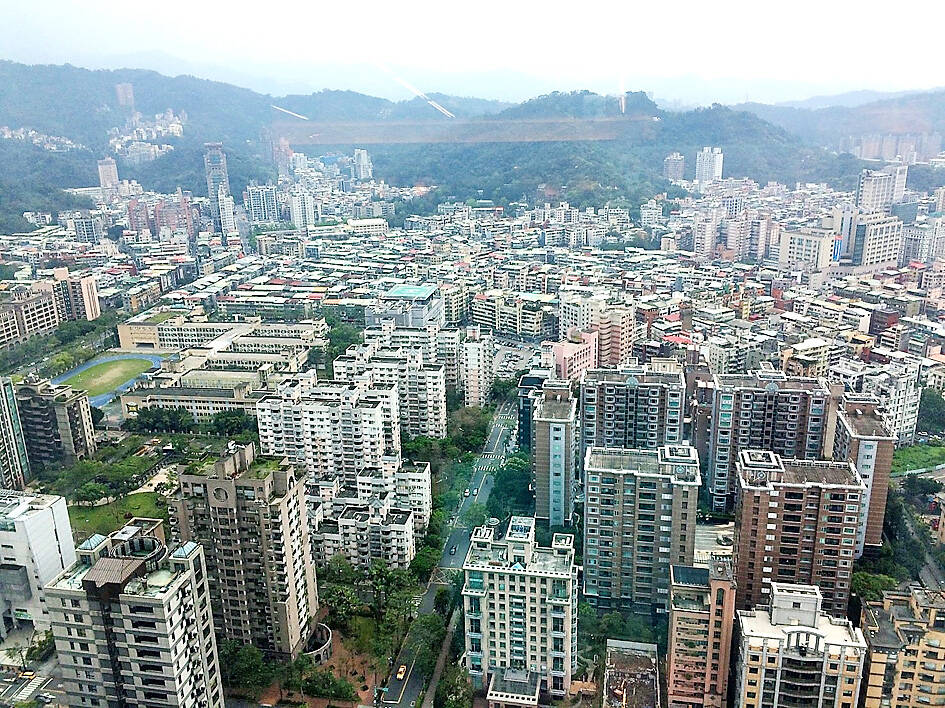The value of reverse mortgages grew at a slower pace last quarter as the central bank’s rate hikes increased interest payments for such loans, the Financial Supervisory Commission said last week.
Reverse mortgages allow homeowners to borrow money against the value of their homes without having to move out, with monthly interest payments linked to the central bank’s policy rates.
Most local banks offer reverse mortgages to people over the age of 60, the commission said.

Photo: Kelson Wang, Taipei Times
Last quarter, reverse mortgages rose 3.64 percent quarter-on-quarter to NT$36.2 billion, the third-lowest quarterly increase on record, the commission said.
Two of the 15 banks providing reverse mortgages reported a lower sum than the previous quarter, it said.
The commission attributed the slower momentum to the central bank implementing three consecutive rate hikes from March.
The number of reverse mortgage applications in Taipei was flat last quarter, commission data showed.
The number of reverse mortgage applications in Taipei and New Taipei City totaled 3,273 at the end of last month, or 50.96 percent of the total, down from 51.48 percent at the end of last year, while applications in Yunlin County, Chiayi County and Tainan increased to 8.23 percent, up from 7.82 percent over the same period, the commission said.
The commission said the increase in the number of applications in southern Taiwan reflected a recent uptick in housing prices in the region, as well as an increase in consumer interest.

‘SWASTICAR’: Tesla CEO Elon Musk’s close association with Donald Trump has prompted opponents to brand him a ‘Nazi’ and resulted in a dramatic drop in sales Demonstrators descended on Tesla Inc dealerships across the US, and in Europe and Canada on Saturday to protest company chief Elon Musk, who has amassed extraordinary power as a top adviser to US President Donald Trump. Waving signs with messages such as “Musk is stealing our money” and “Reclaim our country,” the protests largely took place peacefully following fiery episodes of vandalism on Tesla vehicles, dealerships and other facilities in recent weeks that US officials have denounced as terrorism. Hundreds rallied on Saturday outside the Tesla dealership in Manhattan. Some blasted Musk, the world’s richest man, while others demanded the shuttering of his

ADVERSARIES: The new list includes 11 entities in China and one in Taiwan, which is a local branch of Chinese cloud computing firm Inspur Group The US added dozens of entities to a trade blacklist on Tuesday, the US Department of Commerce said, in part to disrupt Beijing’s artificial intelligence (AI) and advanced computing capabilities. The action affects 80 entities from countries including China, the United Arab Emirates and Iran, with the commerce department citing their “activities contrary to US national security and foreign policy.” Those added to the “entity list” are restricted from obtaining US items and technologies without government authorization. “We will not allow adversaries to exploit American technology to bolster their own militaries and threaten American lives,” US Secretary of Commerce Howard Lutnick said. The entities

Minister of Finance Chuang Tsui-yun (莊翠雲) yesterday told lawmakers that she “would not speculate,” but a “response plan” has been prepared in case Taiwan is targeted by US President Donald Trump’s reciprocal tariffs, which are to be announced on Wednesday next week. The Trump administration, including US Secretary of the Treasury Scott Bessent, has said that much of the proposed reciprocal tariffs would focus on the 15 countries that have the highest trade surpluses with the US. Bessent has referred to those countries as the “dirty 15,” but has not named them. Last year, Taiwan’s US$73.9 billion trade surplus with the US

Prices of gasoline and diesel products at domestic gas stations are to fall NT$0.2 and NT$0.1 per liter respectively this week, even though international crude oil prices rose last week, CPC Corp, Taiwan (台灣中油) and Formosa Petrochemical Corp (台塑石化) said yesterday. International crude oil prices continued rising last week, as the US Energy Information Administration reported a larger-than-expected drop in US commercial crude oil inventories, CPC said in a statement. Based on the company’s floating oil price formula, the cost of crude oil rose 2.38 percent last week from a week earlier, it said. News that US President Donald Trump plans a “secondary